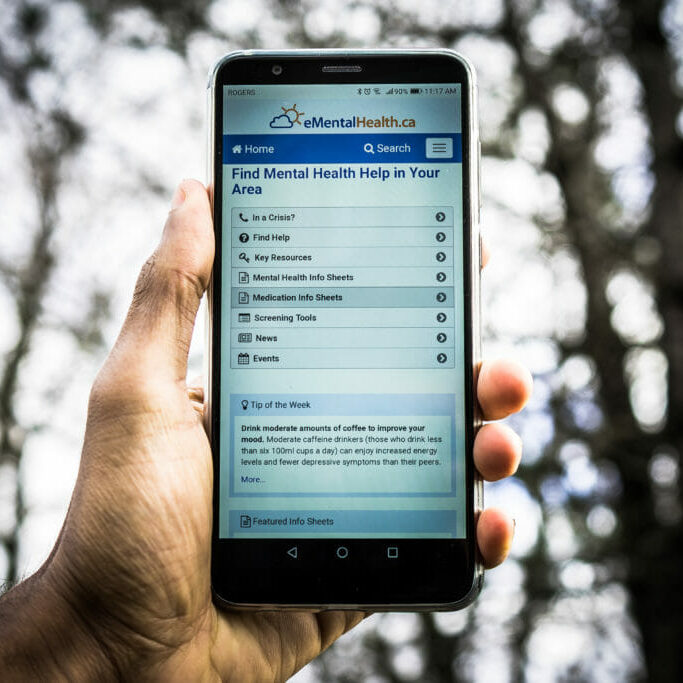
A new way to get help?
Nova Scotia welcomes a new form of mental health treatment
A variety of e-mental health tools are currently being piloted across Nova Scotia’s post-secondary campuses. The hope is that these tools will help alleviate appointment wait-times and provide counselling alternatives to students in need.
“As someone who had seen and used on-campus counselling, I saw the pros and cons to what on-campus counselling was like and understood the need for something more,” said Clancy McDaniel, a fourth-year student at St. Francis Xavier University. “Being able to talk online about your classes or a program, by having other peer listeners who come from the same place as you, it makes it a lot easier to talk and for the other person on the line to understand.”
E-Mental health is the idea that different kinds of mental health services can be provided using an online or digital platform.
It’s everything from online self-help to psycho-education to online peer support and it is meant to expand to include the entirety of the mental health spectrum.
Nova Scotia launch
The e-mental health tools that have just launched at every campus across Nova Scotia are focused on both student and faculty training and treatment and were designed to be implemented into existing counselling services on post-secondary campuses.
“Our hope was to open up accessibility to give students more opportunities to enter the system,” said Dr. Elizabeth Cawley, coordinator for the Association of Atlantic Universities and one of the main forces behind the project. “It was really supposed to expand the service offerings, increase accessibility and increase the service capacity of counselling centres.”
There are four main tools being introduced. All are part of an NGO called Healthy Minds Cooperation NS. Each program is available online, 24/7, and branch into either online peer support, online mental health literacy training and self-directed cognitive behavioural therapy.
There is a 24/7, 365-day telephone crisis number for severe situations. Each tool can be adapted to accommodate most individual student’s needs to fully encompass the care they desire.
According to Crawley, the Stepped Care model is a model of psychological service delivery that states that not everybody needs a 50-minute counselling session. Cawley explained that these tools explore alternate forms of care.
“We were trying to provide some of the lower steps of the Stepped Care model to take some of the pressure off of the counsellors in the counselling centres so that they could dedicate more time to students in significant distress.”
“For me, as someone who does regularly go to counselling, I like the program because as a student who is very busy … I know when it comes to my mental health, I have to be proactive,” said McDaniel, “Being able to talk, for me in my experience, helps a lot. It has more quality, being able to actually speak to people. And so being able to speak to someone over the phone was wonderful and very accessible.”
According to a press release, the e-mental health programs now available in Nova Scotia are Therapy Assistance Online, 7 cups, Kognito, and Good 2 Talk. Many of these programs were funded and launched in a different province (mainly Ontario), and after receiving positive results, they are now being tested out in Nova Scotia across campuses. At Memorial University and across Ontario, many of these tools have already been implemented and are being used by thousands of students. After its launch in Ontario, Good 2 Talk received more than 50,000 calls from post-secondary students in its first year alone.
Proven-based results
“One of the great things about this strategy is that we are collecting data and making sure that these tools are working on our campuses.” said Tristan Bray, Executive Director of StudentsNS. “Part of the whole implementation of this strategy is collecting data and making sure that they’re working and increasing the efficiency of our counselling services.”
Healthy Minds Cooperation Nova Scotia is currently lobbying to have this one-year pilot project be extended with additional funding to three years so that they can collect additional data and continue to prove that what they are doing is worthwhile and beneficial to students.
“A lot of students face stress and anxiety and struggle to deal with their feelings on the lower end of the mental health spectrum,” said McDaniel “To have a toll-free, 24/7 line where within 10 minutes you’re going to be matched with someone who is knowledgeable in the topics that you’re bringing forward, I think this is a really great way to tackle the stigma and the shortage and is such a phenomenal option for students.”






